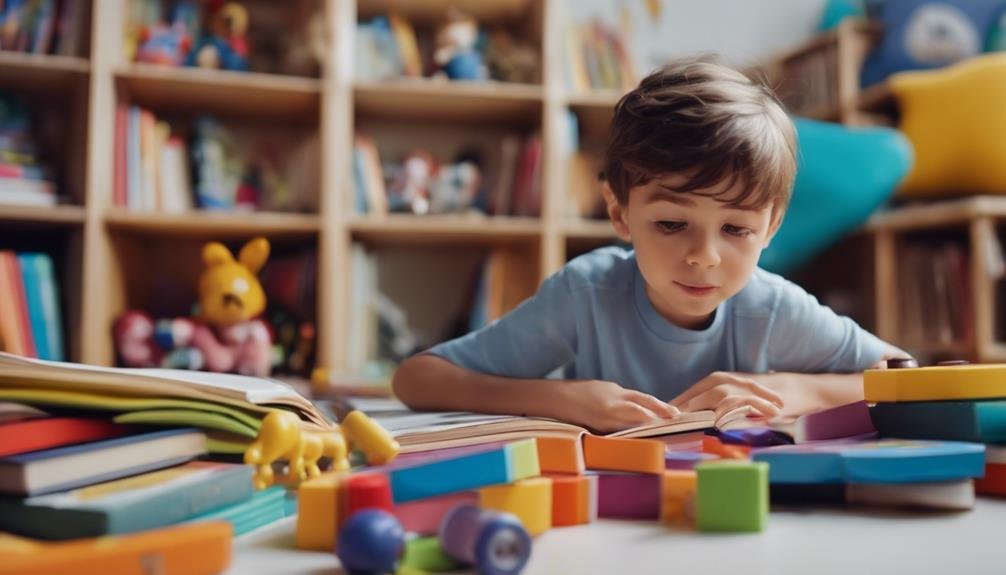"Cherishing Little Steps - A Haven for Baby and Family Journeys"
Language Development in Early Childhood: Strategies for Success
As a budding gardener carefully tends to their seeds, nurturing language development in early childhood requires thoughtful cultivation.
Imagine each word spoken or gesture made as a seed planted in the fertile soil of a child's mind, waiting to blossom into a rich tapestry of communication.
The strategies for fostering this growth are varied and nuanced, from simple conversations to engaging activities that spark curiosity and creativity.
By exploring these methods with intention and consistency, you can lay the foundation for a lifetime of linguistic success in your little one.
Key Takeaways
- Early language exposure enhances cognitive growth and vocabulary, crucial for long-term language development.
- Interactive activities like role-playing and storytelling nurture conversational skills effectively.
- Play-based vocabulary building through games and storytelling promotes enjoyable language learning.
- Utilizing music, rhymes, and multilingualism enriches language experiences and aids in cultural integration.
Importance of Early Language Exposure

To truly understand the significance of early language exposure, consider this: the first few years of a child's life play an important role in shaping their language development. Language exposure during this critical period is crucial for fostering cognitive development. Early intervention in language exposure can have a significant long-term impact on a child's linguistic abilities and overall academic success.
During the early years, children's brains are like sponges, absorbing language and forming neural connections at a rapid pace. This is why exposing them to a rich linguistic environment from the start is so important. Research has shown that children who receive ample language exposure in their formative years tend to have better vocabulary skills, enhanced communication abilities, and improved cognitive function later in life.
Encouraging Conversational Skills
Encouraging conversational skills in young children involves creating opportunities for interactive dialogue that stimulate their language development naturally. To help you foster these essential skills, here are some effective strategies:
- Role playing scenarios: Engage your child in pretend play where they can act out different roles and have conversations in various contexts. This helps them practice language in a fun and imaginative way.
- Interactive games: Play games that require communication, such as 'Simon Says' or 'I Spy'. These activities encourage your child to express themselves verbally and listen actively to others.
- Storytelling sessions: Encourage your child to narrate their own stories or ask them open-ended questions about a book you read together. This promotes conversational skills and boosts their creativity.
- Family discussions: Include your child in family conversations, allowing them to share their thoughts and opinions. This inclusive environment nurtures their ability to engage in meaningful dialogues.
Reading Aloud and Storytelling

Engaging in reading aloud and storytelling with your child can greatly enhance their language development and stimulate their imagination in a meaningful way. Through interactive engagement, you create a special bond with your child while promoting their language skills. Storytelling allows for creative expression, encouraging your child to explore their thoughts and emotions in a safe environment. It fosters a love for language and literature from an early age, setting the foundation for a lifelong passion for reading.
| Benefits of Reading Aloud and Storytelling | ||
|---|---|---|
| Enhances language development | Stimulates imagination | Promotes bonding with your child |
| Encourages creativity | Fosters a love for literature | Supports emotional development |
| Builds vocabulary | Develops listening skills | Boosts cognitive abilities |
Reading aloud and storytelling are not just activities; they are powerful tools that shape your child's language skills and nurture their creativity. So, grab a book, start reading, and let your child's imagination soar through the magic of storytelling!
Building Vocabulary Through Play
Through play, you can actively build your child's vocabulary, enriching their language skills in a fun and engaging manner. Here are some effective ways to enhance vocabulary through play:
- Pretend Play: Encourage your child to engage in imaginative scenarios where they can take on different roles and act out various scenes. This type of play allows them to explore new words and phrases related to different roles and situations.
- Interactive Games: Play word games like 'I Spy' or 'Simon Says' that require verbal interaction and the use of different vocabulary words. These games make learning new words enjoyable and interactive for your child.
- Building Blocks: Use building blocks or puzzles with words on them to help your child associate objects with their names. This hands-on approach can enhance their vocabulary in a tactile way.
- Storytelling: Encourage your child to create their own stories during playtime. This fosters creativity and allows them to experiment with new words and expressions in a playful setting.
Using Music and Rhymes

To enhance your child's language development in early childhood, incorporating music and rhymes into their daily routine can be a fun and effective way to boost their vocabulary and linguistic skills.
Musical engagement through nursery rhymes helps children learn rhythmic patterns, aiding in language immersion. The repetitive nature of nursery rhymes helps children anticipate the next word, enhancing memory and cognitive skills.
When you sing or recite rhymes with your child, you create a bonding experience that also stimulates their auditory senses. The catchy tunes and playful lyrics make learning enjoyable, encouraging active participation and making language learning feel like a game.
Additionally, incorporating music and rhymes into your child's routine can help improve their pronunciation and speech fluency. So, next time you're looking for a simple and engaging way to enhance your child's language skills, try adding some musical and rhyming elements to your daily interactions.
Incorporating Multilingualism
Incorporating multilingualism into your child's daily routine can enrich their language development in early childhood. By embracing different languages at home, you aren't only fostering cultural integration but also providing cognitive benefits that can enhance your child's overall development.
Here are some strategies to incorporate multilingualism effectively:
- Family Involvement: Encourage all family members to speak their native languages with your child, creating a diverse linguistic environment at home.
- Language Immersion: Engage your child in activities like reading books, watching movies, or singing songs in different languages to immerse them in a multilingual experience.
- Cultural Integration: Explore cultural events, celebrations, and cuisine related to the languages your child is learning to deepen their understanding and connection to different cultures.
- Consistency is Key: Establish consistent language routines to help your child become familiar and comfortable with using multiple languages in various contexts.
Limiting Screen Time for Language Development

Limit distractions by setting boundaries on screen time to enhance your child's language development during early childhood. Screen time restrictions play an important role in fostering language growth. Excessive exposure to screens can impede communication development, as it may replace valuable interactions that aid in language acquisition. Striking a healthy technology balance is key to promoting your child's language skills.
When limiting screen time, consider setting specific time limits for different types of technology use. Encourage activities that involve verbal communication, such as reading books together, engaging in imaginative play, or having conversations. These interactions provide rich language input and help expand your child's vocabulary.
It's also important to model good screen habits yourself. Children learn by observing, so demonstrating responsible technology use can positively influence their behavior. By creating a tech-friendly but balanced environment, you can support your child's language development and overall well-being.
Engaging in Language-Rich Activities
Consider engaging your child in language-rich activities to promote their language development during early childhood. Here are some effective strategies to help you create an engaging language environment for your little one:
- Interactive Games: Engage in activities like charades, Simon Says, or I-Spy to encourage verbal communication and vocabulary expansion.
- Creative Play: Encourage your child to engage in imaginative play with toys or puppets, fostering storytelling and language skills development.
- Reading Together: Make reading a daily routine, exploring different genres and discussing the storylines to enhance comprehension and communication skills.
- Sing-Alongs and Rhymes: Singing songs and reciting rhymes can help with language rhythm, pronunciation, and memory retention.
Providing Positive Reinforcement

Boost your child's language development by providing positive reinforcement when they engage in language-rich activities. Behavior reinforcement plays an important role in language acquisition during early childhood. Encouraging participation and offering positive feedback can greatly enhance your child's language skills.
When your child makes an effort to communicate, whether through words, gestures, or sounds, acknowledge their attempts with enthusiasm. Positive reinforcement, such as praise or a simple 'good job,' can motivate them to continue practicing and improving their language abilities. By reinforcing their language-rich behaviors, you're reinforcing the importance and value of communication.
Celebrate small victories and progress along the way. When your child tries out new words, sentences, or engages in conversations, make sure to recognize their efforts. Your positive feedback will boost their confidence and encourage them to explore and expand their language skills further.
Seeking Professional Support When Needed
If you notice any significant delays or concerns in your child's language development, seeking professional support can provide valuable insights and guidance. It's important to address any issues promptly to support your child's language growth effectively.
Here are some steps to think about:
- Speech Therapy: Engaging in speech therapy can help your child develop essential communication skills through structured interventions tailored to their needs.
- Language Assessment: A thorough language assessment can pinpoint areas of strength and weakness in your child's language development, guiding the intervention process effectively.
- Intervention Programs: Participating in specialized intervention programs can offer targeted support to address specific language challenges your child may be facing.
- Regular Evaluation: Regular evaluation of your child's progress is important to monitor the effectiveness of interventions and make necessary adjustments along the way.
Monitoring and Celebrating Progress
To track your child's language development effectively, regularly monitor their progress and celebrate milestones along the way. It's important to acknowledge and appreciate the progress your child makes in their language skills. Celebrating milestones not only boosts their confidence but also motivates them to continue learning and growing. Below is a table to help you track your child's progress and find opportunities to celebrate their achievements:
| Tracking Progress | Celebrating Milestones |
|---|---|
| Keep a language development journal | Throw a small celebration for reaching a language milestone |
| Use language assessment tools | Create a special activity to mark progress in speech development |
| Observe interactions with others | Give verbal praise and encouragement for language improvements |
| Regularly engage in conversations | Share their achievements with friends and family |
| Monitor vocabulary growth | Reward their efforts with a favorite activity or treat |
Frequently Asked Questions
How Can Parents Address Speech Delays in Their Child's Language Development?
Address speech delays by seeking early intervention through speech therapy. Enhance parent-child interactions by modeling language. Your involvement is vital in supporting your child's language development. Stay engaged, patient, and seek professional guidance when needed.
What Are Some Effective Strategies for Fostering Language Development in Children With Sensory Processing Issues?
To foster language development in children with sensory processing issues, focus on sensory integration. Encourage multisensory learning experiences, which can enhance communication skills. Engage in activities that stimulate various senses, aiding in language acquisition and overall development.
Are There Specific Techniques for Helping Bilingual Children Maintain Fluency in Both Languages?
To help bilingual children maintain fluency in both languages, try code switching techniques to blend languages naturally. Language immersion methods, like reading, talking, and playing in both languages daily, can deepen their skills and cultural connection.
How Can Parents Support Their Child's Language Development if They Themselves Are Not Fluent in the Dominant Language of Their Community?
When you're not fluent in the dominant language, you can still nurture your child's language development like a gentle gardener tending to fragile blossoms. Engage in language immersion, cultural activities, bilingual storytime, and playful language games.
What Role Do Cultural Differences Play in Shaping Language Development in Early Childhood?
In shaping language development in early childhood, cultural influences play a significant role. Understanding how cross-cultural communication impacts language growth can help you navigate these differences effectively, fostering a rich linguistic environment for your child.
Conclusion
In summary, nurturing a child's language development in early childhood is pivotal for their future success.
Remember, 'Rome wasn't built in a day.' By consistently engaging in conversations, reading aloud, playing language-rich activities, and seeking professional support when needed, you can help your child build a strong foundation for language skills.
Celebrate their progress along the way and watch them flourish into confident communicators. Your efforts now will shape their language abilities for years to come.


